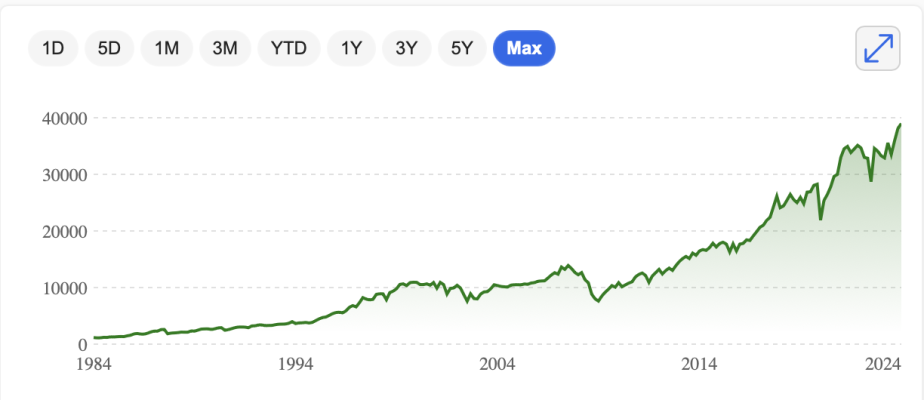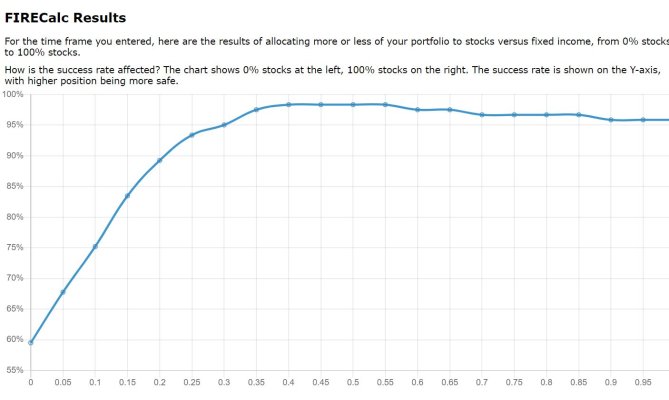24601NoMore
Thinks s/he gets paid by the post
- Joined
- Dec 8, 2015
- Messages
- 1,166
We're both in our 60s (me - early, wife - mid) and are getting increasingly uncomfortably holding equities - even at our current ~22% of portfolio. Largely because of current excessively stretched valuations and what I see happening in the economy - and also because an even 25% let alone 50% drop would represent a big chunk of $$s that I'd feel pretty stupid seeing vanish (albeit, "on paper"). Instead, my gut is literally screaming at me to sell to get down to maybe 15% of the total value of our portfolio, if that.
Wondering if anyone else feels the same and has taken steps to reduce equity exposure as you get later in life?
Our goals are simple: protect what we've worked decades to accumulate, and guard against inflation best we can, while having "enough" to get to end of life comfortable (but not extravagantly). Our goals do not include planning to leave a large inheritance for heirs.
2 problems: inflation has eaten up 18% cumulative the past 3 years, and while the rate of price increases has slowed, it's reasonable to assume that it's going to continue to run at a higher than normal clip given current Federal spending and policy. So, every dollar we had saved is now worth 82 cents. I'm concerned about will happen the next 5, 10 and even 20 years that will further chip away at our piggybank. I truly believe we live in very abnormal times and do not see that changing anytime soon.
Secondly, equity valuations are stretched to what I personally think are crazy levels. Shiller PE is at 34+ (!) and peeling back the economic numbers, things are not nearly as rosy as some like to represent.
So, we're caught between a rock and hard place.
My gut tells me to lock in some profits at these levels, wait for the pullback that I'm pretty confident will occur sometime in 2024 - especially with Summer coming up AND an election year upon us, and buy back in at 10-25% (or possibly even cheaper) levels - or maybe NOT buy back in and just live off cash (CDs, MYGAs, MMs, etc). Incidentally, I've modeled that out and it works through age 90..IF inflation doesn't go totally bonzo, which there's no guarantee of anymore.
It's worth mentioning that neither of us is that likely to live to our 90s for various health reasons. I'm guessing we'll be lucky to make it to "average" life expectancy. We also (assuming we both live that long) will have pretty decent SS that will pay a good chunk of the monthly bills, assuming THAT also is still able to pay as planned. So, let's say we have ~20 years left. We could literally cash out, bury the money in the backyard (or put it all in Treasuries), and probably be fine. So I struggle to justify owning ANY stocks or bond funds. But "you HAVE to own stocks forever to keep up with inflation!" has been drilled into my head for 40+ years, and it's hard to overcome the brainwashing even though my gut is telling me "run for the hills! Save yourself, before things go 'splat' in a big way.."
Anyone else (especially those 60+) have the same concerns, assuming your goals don't include leaving a large inheritance to your heirs and you're just looking to get through end of life safely/comfortably?
Wondering if anyone else feels the same and has taken steps to reduce equity exposure as you get later in life?
Our goals are simple: protect what we've worked decades to accumulate, and guard against inflation best we can, while having "enough" to get to end of life comfortable (but not extravagantly). Our goals do not include planning to leave a large inheritance for heirs.
2 problems: inflation has eaten up 18% cumulative the past 3 years, and while the rate of price increases has slowed, it's reasonable to assume that it's going to continue to run at a higher than normal clip given current Federal spending and policy. So, every dollar we had saved is now worth 82 cents. I'm concerned about will happen the next 5, 10 and even 20 years that will further chip away at our piggybank. I truly believe we live in very abnormal times and do not see that changing anytime soon.
Secondly, equity valuations are stretched to what I personally think are crazy levels. Shiller PE is at 34+ (!) and peeling back the economic numbers, things are not nearly as rosy as some like to represent.
So, we're caught between a rock and hard place.
My gut tells me to lock in some profits at these levels, wait for the pullback that I'm pretty confident will occur sometime in 2024 - especially with Summer coming up AND an election year upon us, and buy back in at 10-25% (or possibly even cheaper) levels - or maybe NOT buy back in and just live off cash (CDs, MYGAs, MMs, etc). Incidentally, I've modeled that out and it works through age 90..IF inflation doesn't go totally bonzo, which there's no guarantee of anymore.
It's worth mentioning that neither of us is that likely to live to our 90s for various health reasons. I'm guessing we'll be lucky to make it to "average" life expectancy. We also (assuming we both live that long) will have pretty decent SS that will pay a good chunk of the monthly bills, assuming THAT also is still able to pay as planned. So, let's say we have ~20 years left. We could literally cash out, bury the money in the backyard (or put it all in Treasuries), and probably be fine. So I struggle to justify owning ANY stocks or bond funds. But "you HAVE to own stocks forever to keep up with inflation!" has been drilled into my head for 40+ years, and it's hard to overcome the brainwashing even though my gut is telling me "run for the hills! Save yourself, before things go 'splat' in a big way.."
Anyone else (especially those 60+) have the same concerns, assuming your goals don't include leaving a large inheritance to your heirs and you're just looking to get through end of life safely/comfortably?



